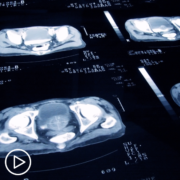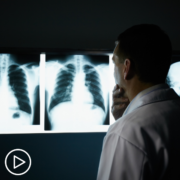What Is Advanced Prostate Cancer?
What Is Advanced Prostate Cancer? from Patient Empowerment Network on Vimeo.
When is prostate cancer considered advanced? What are the symptoms? Expert Dr. Rana McKay explains.
Katherine Banwell:
What does it mean for prostate cancer to be considered advanced?
Dr. Rana McKay:
So, generally what that means is that the cancer may have spread outside of the body – outside of prostate to other parts of the body such as the bone or the lymph nodes which is a common location where prostate cancer can go. Additionally, it may mean that the cancer may have come back after it was initially treated with an intent to cure a patient. But then you know the PSA demonstrates, that you know, there’s a rise in the PSA, and the cancer is recurrent.
Katherine Banwell:
Right. That makes sense. What are the common symptoms of advanced prostate cancer?
Dr. Rana McKay:
So, you know, I would probably say there common symptoms and just because somebody has these symptoms doesn’t mean they have prostate cancer. But fatigue, weight loss, urinary symptoms, trouble urinating, you know, benign prostatic atrophy is one of the most common symptoms or most common conditions in men and –
Katherine Banwell:
What does that mean?
Dr. Rana McKay:
So sort of benign enlargement of the prostate. You know that’s a common phenomenon that happens with age, and it can affect somebody’s ability to urinate.
But, you know sometimes with prostate cancer it can also impact somebody’s ability to urinate. Their stream, their flow. They may have rectal discomfort. They may feel tired, boney pains. Usually, I tell patients you know persistent progressive symptoms that are just, you know, not going away, not getting better. Those need to be looked at by a physician to evaluate further.













